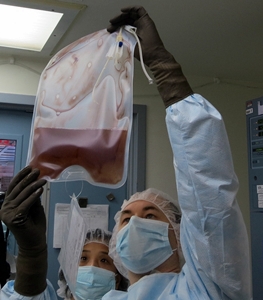7 July 2014. The U.S. Food and Drug Administration designated as a breakthrough a personalized immunotherapy developed by University of Pennsylvania in Philadelphia to treat acute lymphoblastic leukemia that does not respond to other treatments or has relapsed. FDA assigns a breakthrough designation and accelerates review of drugs or biologic therapies that treat a serious or life-threatening condition, and show evidence of substantial improvement over current treatments.
Acute lymphoblastic or lymphocytic leukemia is a cancer of the blood or bone marrow where a mutation causes abnormal bone marrow cells to continue to grow and proliferate. The abnormal cells called lymphoblasts do not function properly and crowd out healthy white blood cells. The disease is the most common form of cancer in children, in whom it is easier to treat, but acute lymphoblastic leukemia in adults is more difficult to treat.
Penn’s experimental immunotherapy uses a technology code-named CTL019 that harnesses a protein called a chimeric antigen receptor found on the surface of immune-system T-cells and binds to the surface of cancer cells associated with acute lymphoblastic leukemia and the related chronic lymphocytic leukemia expressing a protein known as CD19.
The treatments first extract T-cells from the blood of a leukemia patient, then genetically reprogram the T-cells to target cells in the patient expressing the CD19 protein. The reprogrammed cells are returned to the patient to multiply, search out, and bind to cells with CD19 on their surfaces. At the same time, the new infused T-cells ignore cells without CD19, thus avoiding the often harmful side-effects associated by conventional cancer therapies.
Penn is developing the CTL019 technology in a partnership with the pharmaceutical company Novartis, under a 2012 deal that gives Novartis an exclusive license to chimeric antigen receptors developed through the partnership for all treatments, including acute lymphoblastic leukemia. Under the agreement, Penn is entitled to research funding from Novartis, as well as milestone payments for the achievement of clinical, regulatory, and commercial milestones, plus royalty payments from future sales.
The breakthrough designation is based in part on results from a clinical trial of children and some adults with acute lymphoblastic leukemia, reported last year at a meeting of the American Society of Hematology. The university reported on the first 27 of the 55 patients treated in the trial. Of the 22 children in the sample, 19 experienced a complete remission, while 5 patients relapsed as a result of new cancer cells that did not express the CD19 target.
Of the 5 adult patients, all experienced completed remission, with the longest remission period continuing 6 months after treatment. One patient received a bone marrow transplant, while another patient relapsed after 3 months, where cancer cells tested negative for the CD19 target.
The university says Penn and Novartis developed and are testing a comparable chimeric antigen receptor therapy for chronic lymphocytic leukemia, while treatments for non-Hodgkin lymphoma and myeloma are under development. The parties are also testing similar immunotherapies for mesothelioma, ovarian, breast, and pancreatic cancer.
Read more:
- FDA Grants Experimental Leukemia Drug Orphan Status
- Engineered Antibody Given FDA Breakthrough Tag for Myeloma
- Early Trial Shows Immunotherapy Evidence With Some Tumors
- Biopharma, University Partner on Blood Cancer Immunotherapy
- FDA Lifts Hold on Blood Cancer Therapy Clinical Trials
* * *


 RSS - Posts
RSS - Posts
You must be logged in to post a comment.